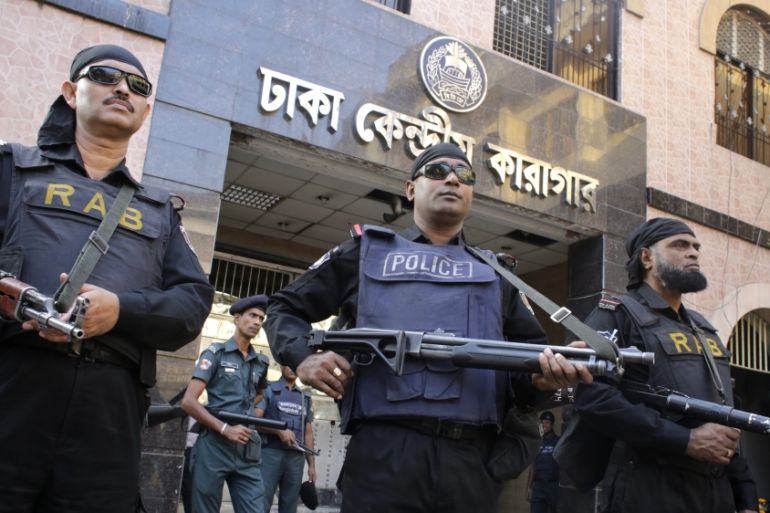‘Bangladesh jails overburdened by political prisoners’
International Crisis Group says criminal justice system is politicised and dysfunctional, a claim that Dhaka denies.

Bangladesh’s criminal justice system is so politicised that it is “undermining rather than buttressing the rule of law”, according to a report by the International Crisis Group, which was immediately rejected as biased by the government.
The report, “Political Conflict, Extremism and Criminal Justice”, said that in the last few years of the Awami League rule, law enforcement authorities have concentrated their efforts on “targeting the opposition” rather than curbing criminality.
Years of partisan recruitment, promotions and postings have polarised these institutions to the point that officials no longer conceal their allegiances
As a result, prisons are overburdened by mass arrests of opposition leaders and activists, and the judiciary, “perceived as partisan”, is losing credibility, the report, published on Monday, said.
“The result is a justice system that swings between two extremes: woefully slow and dysfunctional for ordinary cases and speedy, undermining due process, in politically charged ones,” the Brussels-based organisation said.
WATCH: Is Bangladesh becoming a one-party state?
It said that the legal environment created opportunities for what it called “extremist” outfits to regroup, manifested in the killings of secular bloggers and foreigners and attacks on sectarian and religious minorities in 2015.
Iqbal Sobhan Chowdhury, the prime minister’s press secretary, dismissed the report, saying that the findings were “biased and motivated rather than being objective. These are rash comments, without showing any basic facts … What the report says does not reflect the actual reality”.
“As to saying that the law enforcing agencies are concentrating on the opposition rather than criminals, I don’t think that it can give any specific facts or they have done any survey that can justify such a comment,” Chowdhury said.
“Only recently, the largest opposition party, the Bangladesh Nationalist Party could hold their national council very openly with the government and law enforcement cooperation, and they did not face any problems.”
‘Brutal state response’
The report placed the conflict between the current governing party, the Awami League and the main opposition party, the Bangladesh Nationalist Party – which it says has reached new heights – at the heart of the crisis within the country.
In January 2014, after the Awami League finished a five-year term in office, opposition parties boycotted the national elections, allowing the party, under Sheikh Hasina to remain in power.
“By September 2014, some 24,000 opposition BNP leaders and activists had been charged in some 500 cases, including acting Secretary General Fakhrul Islam Alamgir, two joint secretaries general and several standing committee members,” the report said.
READ MORE: Bangladesh court upholds Islam as religion of the state
In an attempt to force new elections, the BNP and its Jamaat-e-Islami ally marked the anniversary of the disputed 2014 elections with “indiscriminately violent strikes and traffic blockades, which were matched brutally by the state.”
“The political conflict between the AL and BNP has resulted in high levels of violence and a brutal state response,”’ the report said.
“The government’s excesses against political opponents and critics include enforced disappearances, torture and extra-judicial killings.”
The report said that even though the opposition has now re-entered the political mainstream, the government continued to deny the it legitimate avenues for participation and dissent.
ICG called on the government to accept “legitimate political opposition and dissent”.